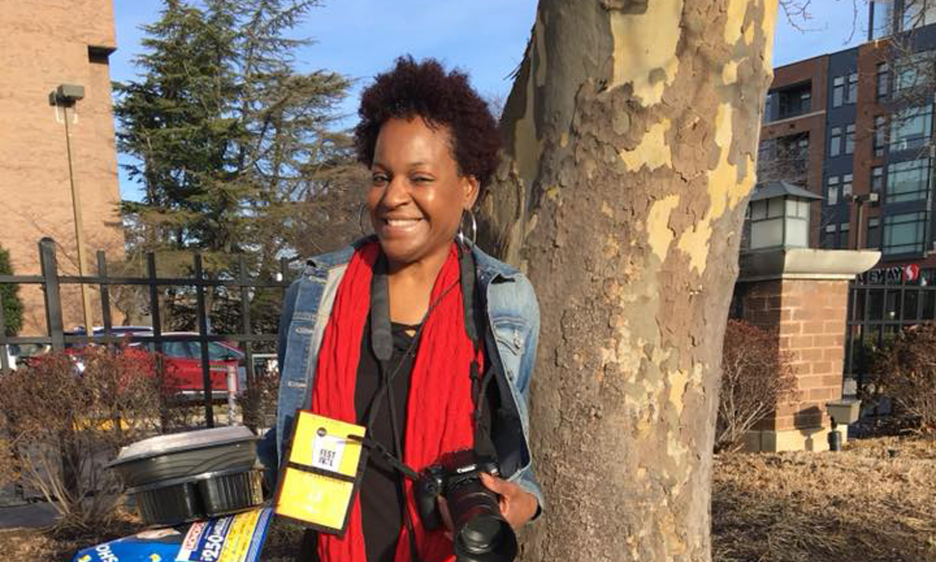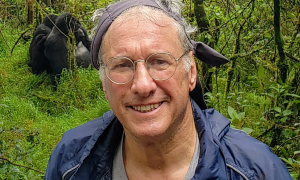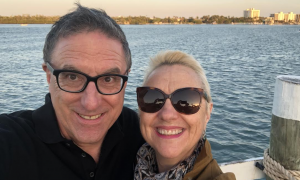Home » Jazz Articles » Out and About: The Super Fans » Meet Joyce Wilson
Meet Joyce Wilson

I was young and didn’t know much about jazz, or what to expect. But I liked what I heard and wanted to learn more about the music and musicians. Some of them looked as if they were my age, so it was a shift in my thinking that jazz musicians were old.
Tell us a bit about yourself.
I was born in Southern California, in Venice Beach, and moved to the Altadena/Pasadena area as a preteen. Presently, I live in the Hermon Area, Los Angeles. I work in the title insurance industry. I am attending school, working on my BA in photography. I've got a great family, many of whom are still in California, scattered as far north to San Francisco and as far south to San Diego.
Music is at the top of my list of passions, followed by photography, swimming, and sewing.
What's your earliest memory of music?
Radios, live music in the parks, neighbors, and especially church music. My brothers and I were not allowed to touch the radio. Our mother wouldn't allow music in the house, and if the radio happened to be on, it would have been tuned to a religious station. I remembered one time, we had just gotten home from church, which by the way was directly next door to our house. "Everybody Plays the Fool" by The Main Ingredient, was playing on the radio, and my mother changed the station to a religious station. I was so mad, because I was learning the lyrics little by little, and I wanted to learn the last verse. For some reason, my mother would refer to anything other than religious music as "devil music," which I didn't understand until I was much older. So going to the park was an exciting time for me, as I knew I would have the opportunity to listen to music non-stop, especially if there were parties or carnivals. If we happened to visit family or friends, that, too, was a treat because there were no limitations when it came to music. Away from home, we could listen to the radio, and play records or even instruments.
But my greatest memory of music came from attending church. I grew up in the Baptist church, and gospel music was always alive and exciting. I could never get enough of it. It's funny, I often wondered if something was wrong with me because I didn't get anything from the preacher's sermon, but I did manage to stay alert, waiting for the music.
How old were you when you got your first record?
When I was 11 years old, I received a KC & the Sunshine Band album for Christmas. I was so excited. I liked his music; it was the kind of music playing at that time, and it had a nice groove. It even came with a poster.
What was the first concert you ever attended?
I attended a Simply Red Concert on a first date. Just waiting for the concert to start was exciting. There was silence, then—WOW! the music started. After attending the concert, I had appreciation like never before, and even though I would listen to cassette tapes or records it just couldn't compare to live music. The energy from the fans—and knowing that I was part of that energy—was fun. The date was bad, but the concert was awesome.
In the mid-'80s I was invited by a classmate to first live jazz concert. I don't remember all the details other than that Wynton Marsalis was performing, and the event took place at the Greek Theater in Hollywood. I was young and didn't know much about jazz, or what to expect. But I liked what I heard. Many thoughts were running through my mind, and stayed with me for a few days. I wanted to learn more about the music and musicians. Some of them looked as if they were my age, so it was a shift in my thinking that jazz musicians were old. I'd been listening to other genres of music, but after that concert I wanted to hear more of the music that they were calling jazz.
Was there one album or experience that was your doorway to jazz?
There are two albums: Look to the Rainbow, a live double album by Al Jarreau is one. I had always liked his voice, and knew many of his songs from other records. But this album was special, because I had it on a cassette tape that a friend had made for me. I found the LP later at a thrift store and played it for days. Talk about memories.
The second album is another live one, Miles Davis's My Funny Valentine: Miles Davis in Concert. A date who was into jazz played it for me on a sound system with great speakers. I hadn't even thought about the role of good speakers before, and I ended up investing in a somewhat expensive stereo system and speakers to appreciate the pristine sound of the album. Even though those albums are on opposite sides of the jazz spectrum, they were important to me. One reason is that after listening to My Funny Valentine, I wanted to know more about trumpet player and his music; at the time I knew very little about Miles Davis. And even though I had many of Al Jarreau's albums, I had not heard anything like Look to the Rainbow. So both albums left me wanting to learn more about jazz.
I started to buy more records and listening to jazz radio stations, like KLON, which would later become KKGO, KKJZ, and is now known as KJazz. I had enjoyed listening to deejay Chuck Niles at the time. Now my all-time favorite radio station is KCSM.ORG, the Bay area's station for jazz. I started subscribing to publications like Jazz Times, and attending jazz festivals.
We met you on Twitter, where your handle is @wrappedinjazz. What is it about jazz that reaches you so strongly?
When I've had a rough day at the office and daily life is nothing short of disastrous, I reach for anything by John Coltrane. After hearing a few bars of his music, I find myself lost in thought. I let my mind drift back in time to a period of when some of his recordings was made. If I play Live at The Village Vanguard, I imagine myself sitting right there at the Vanguard, as close to the stage as possible. It may sound silly, and it's ok; it's a feeling that I find comforting, a way of coping with problems instead of complaining about being overwhelmed. Or maybe it is the feeling I get whenever I'm listening to a song on the radio, waiting until the names of the personnel are announced, and I end up smiling because I'd correctly identified them while I was listening. Or the way I feel when someone who knew nothing about jazz listens to music I've suggested, and lets me know they enjoyed it.
How long have you been going out to hear live music?
Over 35 years, from free concerts in the park, to dinner clubs, to paid performances.
How often do you go out to hear live music?
There was a time I was out every night of the week for many years, but that has tapered off in the last four years. I've been working long hours and studying, and am very exhausted by the time I reach my car. But it's summertime now, and I'm so looking forward to attending the Detroit Jazz Festival Labor Day weekend, and the Monterey Jazz Festival in September.
What is it about live music that makes it so special for you?
The atmosphere, the venue, the energy shared by the people in the audience, seeing the musicians walking onto the stage, preparing to play that first note. Waiting in anticipation for what will be the first song, what will jumpstart the concert.
What are the elements of an amazing concert?
An amazing rhythm section is important, as well as participation from the audience. I tend to look around to see how the audience is receiving the music. There have been times when I am feeling the music and I look around, only to see that no one is swaying, moving their heads, nothing, lifeless. I'm thinking, how can anyone not be moved by the grooves, the tempo, the sounds? But I must remember to let others enjoys music in their own way.
Tell us about an especially memorable performance you've attended.
Last summer, my friend, Trudi Taylor, the daughter of bassist James Leary, invited me to a concert at Disney Hall. Victor Lewis was playing at the performance; I had always heard his name, but hadn't met him. It's kind of funny, because while we were enjoying the music, I kept thinking to myself, who's that on drums? At one point, I thought it was Albert Tootie Heath. I found out it was Mr. Lewis after the concert, when I got to meet him.
What is the most trouble you've gone to to get to a jazz performance?
It was 2016. I was trying to get to the jazz festival in Atlanta and missed two flights because I'd misjudged my travel time to the airport! I almost canceled, but in the long run I hung in there and was finally able to board a flight on standby. After settling in and relaxing for a few hours, I made my way to the festival and had a wonderful time. I was able to meet up with a cousin who lives there. He is a fan of Donald Harrison, and I made his day by introducing them to each other. Was it worth the trouble trying to make it to the festival? Yes, totally.
Is there one concert that got away that you still regret having missed?
Oh my gosh, yes. Each year I tell myself I want to attend the Chicago Jazz Festival, but it's at the same time as Detroit. And for about five years now, I have been trying to attend the North Sea Jazz Festival, but each time, the year starts off with promise, only to end with defeat. However, I am not giving up. I will get there.
If you could go back in time and hear one of the jazz legends perform live, who would it be?
Unfair question. I have too many to list, but will go with Lee Morgan, who has always been one of my favorite trumpet players. I was too young when he toured Southern California back in the day and played at the Lighthouse. I don't know how to explain what it is about him that gets me going. Maybe it's the energy pouring out of his horn as he plays. Lucky for me, I can enjoy his recordings.
What makes a great jazz club?
My all-time favorite jazz club was the Jazz Bakery in its original spot; it was ideal to me. The gathering of people waiting outside, meeting and greeting friends, meeting others for the first time. Now my favorite jazz club is the Blue Whale, located in Little Tokyo, in Los Angeles. [Ed note: Recently, the Jazz Bakery announced it has found a new home at the Moss Theater, Los Angeles.]
Which club(s) are you most regularly to be found at?
The Blue Whale, and The World Stage, a performance space, also in Los Angeles, that was founded by Billy Higgins in 1989.
How do you discover new artists?
Usually by reading jazz magazines and arts sections of newspapers, and from suggestions made by friends.
Vinyl, CDs, MP3s, streaming?
Definitely all of the above.
If you were a professional musician, which instrument would you play and why?
I would be a vocalist. Something about the human voice singing a jazz song is magical to me. Listening to musicians play and a voice accompanying the notes is extraordinary.
What's your desert island disc?
My desert island disc is Miles Davis' Bitches Brew. I've yet to listen to the album in its entirety and being on an island will provide all the time needed to listen.
My second desert island disc is Lee Morgan's The Sidewinder. If there were ever a time when loneliness set in, I know that playing that disc would lift my spirits and help keep my body moving, and my mind off the fact that I am on a desert island.
What do you think keeps jazz alive and thriving?
I feel it's kept alive by musicians sharing their music, as well as fans continuing to support the best possible. Of course, education, promotion of the music through ads, venues and events also contribute to keeping jazz thriving. However; it is by word of mouth that matters most.
Finish this sentence: Life without music would be...
A catastrophe. And miserable.
< Previous
Hidden Details
Comments
Tags
Out and About: The Super Fans
Tessa Souter and Andrea Wolper
Los Angeles
san francisco
wynton marsalis
Al Jarreau
Miles Davis
John Coltrane
Detroit
James Leary
Disney Hall
Victor Lewis
Albert 'Tootie' Heath
Atlanta
Donald Harrison
Chicago
lee morgan
The Jazz Bakery
Blue Whale
Billy Higgins
For the Love of Jazz
 All About Jazz has been a pillar of jazz since 1995, championing it as an art form and, more importantly, supporting the musicians who create it. Our enduring commitment has made "AAJ" one of the most culturally important websites of its kind, read by hundreds of thousands of fans, musicians and industry figures every month.
All About Jazz has been a pillar of jazz since 1995, championing it as an art form and, more importantly, supporting the musicians who create it. Our enduring commitment has made "AAJ" one of the most culturally important websites of its kind, read by hundreds of thousands of fans, musicians and industry figures every month.






















